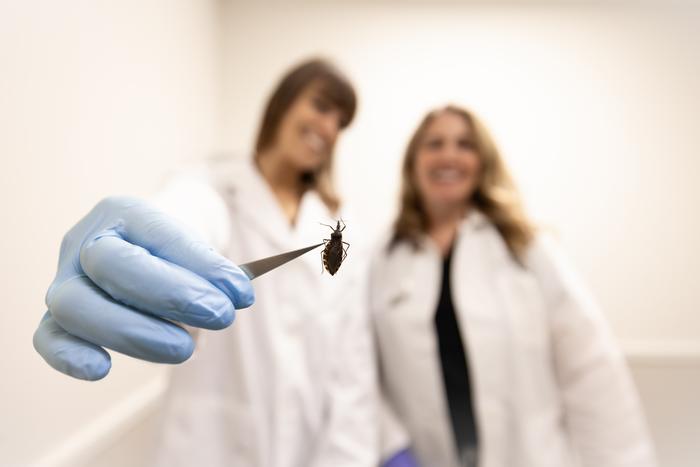A groundbreaking multi-institutional research initiative spearheaded by Texas A&M University in collaboration with the University of Georgia heralds a significant advancement in the understanding and management of Chagas disease, a parasitic infection that imperils both humans and canines. This ambitious project has secured over $4 million in funding from federal and private organizations, underscoring the urgent need to tackle the complex epidemiology, diagnostics, and therapeutic challenges posed by this neglected tropical disease.
Chagas disease, caused by the protozoan parasite Trypanosoma cruzi, remains a formidable public health concern across the Americas, particularly in Latin America. However, emerging evidence demonstrates that the southern United States, especially Texas, represents an increasingly significant hotspot for transmission. The disease vector, triatomine bugs—colloquially known as “kissing bugs” due to their propensity to bite the face—transmit T. cruzi through their fecal matter, which contaminates feeding wounds. The infection is notoriously insidious, often asymptomatic in its acute phase but capable of progressing to chronic cardiomyopathy and gastrointestinal dysfunction, which pose life-threatening complications.
The collaborative research agenda, led by Dr. Sarah Hamer and Dr. Ashley Saunders of Texas A&M’s College of Veterinary Medicine and Biomedical Sciences, alongside Dr. Rick Tarleton of the University of Georgia, exemplifies a comprehensive “One Health” approach. This paradigm underscores the intricate interplay between human, animal, and environmental health and is crucial to dissecting the transmission dynamics of Chagas disease in both canine populations and human communities. By integrating field ecology, clinical veterinary science, and molecular parasitology, the group aims to pioneer novel interventions that transcend traditional disease boundaries.
Diagnosing Chagas disease remains a formidable challenge due to the parasite’s complex life cycle and the limitations of current testing modalities. Conventional molecular diagnostics rely on detecting parasite DNA in host blood samples; however, parasitemia often fluctuates below detectable limits, especially during chronic infection. Additionally, T. cruzi undergoes dormancy phases wherein parasites evade both immune responses and pharmacological treatments. Addressing these intricacies, the researchers propose a multifaceted diagnostic regime combining sensitive polymerase chain reaction (PCR)-based techniques to detect parasite DNA and serological assays that quantify host antibody responses, thereby improving detection accuracy.
Treatment of Chagas disease has long been hampered by the parasite’s recalcitrance to therapy during dormant stages. The primary antiparasitic agents currently used, such as benznidazole, exhibit limited efficacy when parasites enter quiescence, necessitating prolonged or repeated exposure to drugs. Dr. Tarleton’s laboratory has pioneered insights into this challenge, demonstrating that modifying treatment regimens to extend dosing intervals can target parasites as they cyclical reactivate, thereby enhancing drug susceptibility and therapeutic outcomes.
Critically, the research leverages naturally infected dogs within kennel environments, many of which have experienced prior mortalities linked to Chagas disease. This real-world model provides a pragmatic framework to evaluate therapeutic strategies and disease progression in a controlled yet naturally occurring infection setting. Dog owners’ investment in their animals’ health further facilitates longitudinal studies and compliance with treatment protocols, accelerating data collection and analysis.
Parallel investigations supported by the Department of Homeland Security focus on working dogs under federal purview, elucidating both exposure mechanisms and cardiac pathophysiology induced by T. cruzi. These dogs operate in regions with variable endemicity, and relocated animals pose challenges for disease recognition and management in non-endemic areas. Cardiac manifestations range from asymptomatic conduction abnormalities to sudden cardiac death, reflecting the heterogeneous clinical spectrum and underscoring the necessity of surveillance.
A pioneering aspect of this consortium’s work is the development of a clinical staging system for canine Chagas disease. Supported by the American Kennel Club Canine Health Foundation, this framework aims to stratify the severity and progression of cardiac involvement, facilitating tailored therapeutic interventions. Such stratification is vital to optimizing treatment efficacy, enhancing prognostication, and streamlining clinical decision-making in veterinary and comparative medicine.
In tandem with clinical and translational research, community science initiatives, such as the Kissing Bug Community Science Program, have enriched entomological surveillance by engaging the public in collecting and submitting triatomine specimens. This citizen science approach has yielded over a decade of invaluable geographic and ecological data, illuminating vector distribution patterns and infection prevalence across the southern United States, particularly during peak summer activity.
Moreover, the interplay between ecological factors, vector biology, host immunity, and parasite genetics constitutes a complex web that the researchers are meticulously dissecting. By employing integrative methodologies spanning molecular diagnostics, immunological profiling, and ecological modeling, the team is poised to unravel mode of transmission nuances, factors influencing host susceptibility, and parasite persistence dynamics.
As this multifaceted research unfolds, it promises not only to refine diagnostic and therapeutic paradigms for Chagas disease in both humans and dogs but also to elevate awareness among veterinary clinicians, public health officials, and policymakers. Enhanced understanding of disease ecology and pathophysiology, coupled with improved clinical tools, will be instrumental in mitigating the public health burden of this silent yet devastating infection.
Texas A&M University’s College of Veterinary Medicine and Biomedical Sciences remains at the forefront of this pivotal research endeavor, exemplifying interdisciplinary collaboration and translational science aimed at confronting infectious diseases that straddle species barriers. For stakeholders concerned with emerging zoonotic threats, these efforts illuminate pathways toward comprehensive control strategies that embody the essence of “One Health.”
Subject of Research: Chagas disease prevalence, diagnostics, and treatment in canine and human populations.
Article Title: Researchers Advance Novel Diagnostic and Treatment Strategies Against Chagas Disease Through “One Health” Approach
News Publication Date: Not specified
Web References:
https://kissingbug.tamu.edu/
Image Credits: Texas A&M University
Keywords: Chagas disease, Infectious diseases, Parasitic diseases, Trypanosoma cruzi, Kissing bugs, Veterinary medicine, One Health, Diagnostics, Treatment, Canine cardiac health
Tags: Chagas disease in southern United StatesChagas disease researchchronic complications of Chagas infectiondiagnostics and treatment of Chagas diseaseepidemiology of Chagas diseasefunding for neglected tropical diseasesimpact of kissing bugsmulti-institutional research collaborationOne Health approach to Chagaspublic health concerns in Latin AmericaTrypanosoma cruzi transmissionveterinary medicine and Chagas





